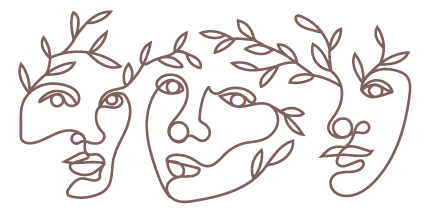Quarantine Tales from an Asian American
Graphic by Libbe Phan
My father comes home with extra lines across his face, the familiar track marks of a mask weathered in between his wrinkles. My mother emerges from her room with keyboard letters imprinted on her fingers, eyes blinking from hours trained on the laptop screen, meetings after meetings after meetings. As they plod with heavy feet into the kitchen, my sisters and I balance on the couch. An aimless TV show plays in the background. This is our lives right now, an American family in quarantine.
I use the word “American” lightly. “American” is not sewn into our bloodline the way it is in my neighbors, who do not need to prove anything yet hang flags on shiny metal rods with un-frayed edges and too-bright colors. Everything about them sings “American” the way my mother’s accent sings “immigrant,” “chink,” “go back to your country,” and “Chinese virus.” I try to remind myself that my father’s washed out scrubs, tired eyes, and stark creases make up for it. But when – and why – has it become necessary to apologize for an indelible aspect of my identity?
Both of my parents came to America with humble backgrounds and hopes so high that they could only be dashed in the future. My mother arrived from China under the Chinese Student Protection Act of 1992 after the political repression of the Tiananmen Square protests. She worked seven days a week at her uncle’s restaurant while studying for her undergraduate and graduate degrees in medical physics. Fortunately, she found a job that she loves to this day. On the other hand, my father studied electrical engineering but found himself juggling passionless jobs throughout his life; just last year, he would make deliveries after 12-hour shifts at the hospital. Night after night, we would hear the garage door creak open at 9 PM, a sigh escaping his lips before he would sit down for dinner. If “American” is not written in my heritage, then “hard work” is.
With this history, I knew I shouldn’t be ashamed of my family’s “immigrant” status. To them, “immigrant” means raising three kids with all the odds against them. Yet, to me, “immigrant” meant hiding my funny-smelling lunch in the cafeteria and eventually begging my parents if I could buy instead. It meant asking my mom to hide her accent or even making fun of it with my friends. Now, it means that people look at me like I wear COVID-19 as a neon badge on my chest. When I still worked at a grocery store at the beginning of the pandemic, I avoided rude glares from customers and awkwardly laughed with my boss, who suggested that “my people” caused the virus. It was easier this way; unlike my parents, I didn’t relish in the hardworking status that came with “immigrant” and instead opted for the simpler route of turning a blind eye. I not only acknowledged casual racism, but I perpetuated and embraced it.
When I quit my job as the pandemic grew worse, I was heartbroken. Oddly enough, I felt a strong sense of loyalty to a place that continually tested my commitment to my identity. Maybe it was because there were others that understood me. After I left, a fellow Asian coworker, who wasn’t even of Chinese descent, experienced dogwhistles and covert snickers from customers and coworkers alike, which transformed into comments like, “He brought coronavirus with him in his pocket.” Customers would wait an extra ten minutes to check out at a white worker’s register rather than his. Or perhaps it was because essential workers shared similar experiences of suffering. At my grocery store, workers received one mask to use over a period of several weeks. My dad constantly complained about the lack of personal protective equipment at his hospital, having to use one mask a day despite his proximity to COVID-positive patients. Paradoxically, he was risking his life to save theirs. “Quid pro quo,” I would say in response, as if this was fair, as if our institutions didn’t fail us.
Even though I am an American citizen, my natural-born residence requires rent, paid in measurable ideas of success. My payment is my father’s output, hours spent in a loveless hospital with the risk of dying exchanged for the chance of living. My payment is my mother’s job, my sisters’ brand name colleges, and my academic success. My payment is laughing with my boss at me and saying nothing in response to my classmate’s bat jokes in the wake of the pandemic. My payment is proving I am American with more Fourth of July shirts than qipaos in my closet. My payment is a wallpapered smile swallowing centuries of discrimination, making up for my existence in the land of the free, home of the brave. My payment is 18 years of complicity.
I’m tired of paying, though, when my neighbors live rent-free and I have exhausted all the various emotions between shame and humiliation. I have produced all that I could, carving holes into my chest until all that’s left is a cavity where my Chinese should have been. Some days feel endless and others flatten like breaths on the tip of a mountain. It seems like I’m waiting for something that never will never come, counting infinite heartbeats like sheep. Something tells me to reclaim my narrative, so I write this.
I sit by myself in quarantine. The garage creaks open, and my dad arrives, the etchings of a mask once again on his face. My mom leaves her room, and my sisters watch the TV. I wonder how long this will go on: how long quarantine will be, and how long it is until I’m comfortable in my own skin.

